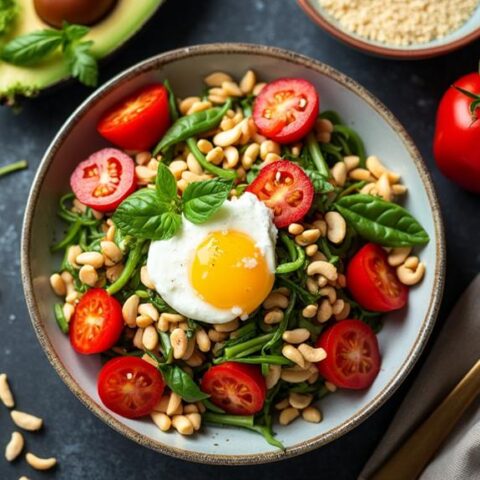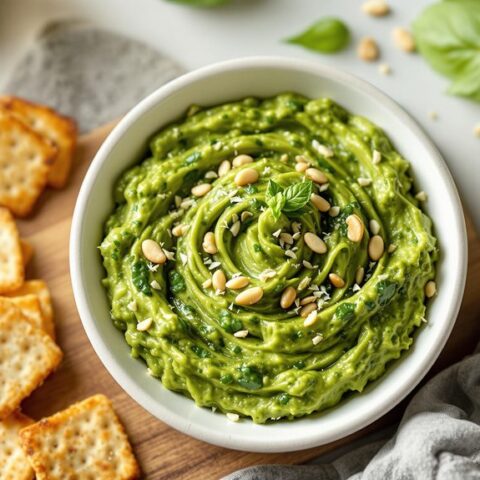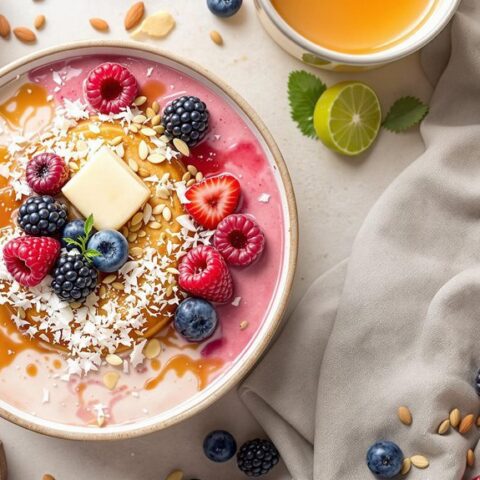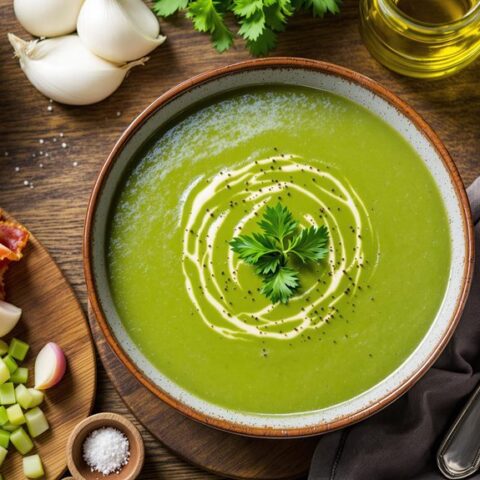
Wonton wrappers are primarily composed of carbohydrates, providing approximately 11 grams of carbs per three-piece serving (20 grams). These wrappers account for about 85% of their caloric value from carbohydrates and contain minimal dietary fiber (0.1 grams), resulting in negligible net carbs adjustment. The carbohydrate content varies slightly by brand, with Dynasty and FRIEDA'S offering 11 and 16.4 grams per serving, respectively. Adhering to low-carb diets requires careful incorporation of these wrappers, possibly paired with low-carb fillings to manage intake efficiently. Exploring strategies for portion control and brand selection could enhance dietary management further.
Key Takeaways
- A standard serving of three wonton wrappers contains approximately 11 grams of total carbohydrates.
- Net carbohydrate content per serving is around 10 grams, with negligible dietary fiber.
- Different brands vary in carbohydrate content, ranging from 11 to 16.4 grams per serving.
- Use a kitchen scale for precise portion control, as three wrappers weigh about 20 grams.
- Incorporate low-carb fillings and limit wrapper usage to maintain dietary carbohydrate limits.
Understanding Serving Sizes
Understanding serving sizes is essential for precise nutritional tracking, particularly when managing carbohydrate intake. Wonton wrappers, a staple in many culinary applications, provide a defined serving size that aids in carbohydrate management. A standard serving size consists of three wonton wrappers, collectively weighing approximately 20 grams.
This specificity in serving size is vital for individuals monitoring their carbohydrate consumption, particularly those adhering to low-carbohydrate or ketogenic diets. Accurate label reading helps prevent misinterpretation and excessive carb consumption, ensuring dietary adherence. Each serving of wonton wrappers contains about 11 grams of total carbohydrates.
The calculation of net carbohydrates, which is the total carbohydrates minus dietary fiber, is particularly straightforward in this case, as the fiber content is negligible. Consequently, the net carbohydrate content is approximately 10 grams per serving. This information is invaluable for dieticians and nutritionists advising clients on appropriate portion sizes and macronutrient distribution, ensuring their dietary plans remain within prescribed carbohydrate limits.
Additionally, the caloric content per serving size of wonton wrappers is approximately 50 calories, positioning them as a low-calorie option suitable for various dietary preferences.
Accurate understanding and utilization of serving sizes facilitate more effective dietary management and nutritional balance, essential for achieving specific health outcomes.
Carbohydrate Content Breakdown
Wonton wrappers contain approximately 15.9 grams of net carbohydrates per 1 oz serving, which is a critical consideration for individuals adhering to low-carb diets.
The high starch content provides a rapid energy source, but minimal dietary fiber (0.5 grams per serving) limits their compatibility with low-carb dietary regimens.
When planning meals, it is important to balance the carbohydrate intake from wonton wrappers with other macronutrients to guarantee nutritional adequacy.
Net Carbs Per Serving
In examining the carbohydrate content of wonton wrappers, each serving size, which consists of approximately three sheets or 20 grams, contains about 11 grams of total carbohydrates. The net carbohydrates, which are essential for those adhering to a low-carb diet, amount to approximately 10 grams per serving. This is calculated by subtracting the dietary fiber content from the total carbohydrates. Significantly, wonton wrappers are low in dietary fiber, contributing 0 grams, thereby making the net carbohydrate calculation straightforward and important for diet planning.
The carbohydrate content in wonton wrappers primarily derives from starch, which positions them as a high-carb option within meals. For individuals following a low-carb diet, understanding the precise carbohydrate breakdown is vital for managing daily intake effectively.
Here is a breakdown of the carbohydrate content per serving:
| Nutrient | Amount (g) | Source |
|---|---|---|
| Total Carbohydrates | 11 | Wonton Wrappers |
| Dietary Fiber | 0 | Wonton Wrappers |
| Net Carbohydrates | 10 | Wonton Wrappers |
This table highlights the low dietary fiber content, underscoring the need for careful consideration when incorporating wonton wrappers into a low-carb dietary regimen.
Low-Carb Diet Compatibility
For those dedicated to maintaining a low-carb diet, the carbohydrate profile of wonton wrappers is a critical consideration. Wonton wrappers typically contain approximately 11-16.4 grams of carbohydrates per serving, varying with brand and type. This carbohydrate content makes them a moderate option for those seeking to manage carbohydrate intake.
The net carbohydrates in wonton wrappers are around 15.9 grams per ounce, necessitating cautious consumption to fit within a low-carb diet framework. The caloric content of each wrapper is relatively low, ranging from 8-50 calories per piece, with a predominant portion of these calories per wrapper deriving from carbohydrates, mainly starch.
Notably, the low-fat content of wonton wrappers, generally around 0.1 grams per wrapper, supports a dietary focus on carbohydrate moderation without contributing additional fats. This characteristic aids in maintaining the macronutrient balance essential for those adhering to low-carb dietary plans.
While the carbohydrate content may seem substantial, incorporating wonton wrappers into meals with low-carb fillings can be a strategic approach. The wrappers provide a pleasing texture and flavor, complementing a low-carb diet when used judiciously. This method allows individuals to enjoy varied dietary options while adhering to their carbohydrate management goals.
Energy Source Considerations
Understanding the carbohydrate content of wonton wrappers is vital for evaluating their role as an energy source within a dietary plan. A standard serving size of 1 oz (28.35g) of wonton wrappers contains approximately 16.4 grams of total carbohydrates, positioning them as a notable carbohydrate contributor in meals. The net carbohydrate content stands at around 15.9 grams per serving, which is an important consideration for individuals adhering to low-carbohydrate diets.
The predominant carbohydrate component in wonton wrappers is starch, a complex carbohydrate that efficiently provides a readily available energy source for the body's metabolic needs. Each wonton wrapper contributes roughly 50 calories, with the majority of these calories derived from carbohydrates. This makes wonton wrappers an efficient energy source, suitable for consumption in dishes requiring quick energy release.
When planning dietary intake, particularly for those monitoring carbohydrate consumption, it is important to factor in the carbohydrate content of wonton wrappers, especially if additional ingredients are used, which can greatly alter the total carbohydrate intake. Consequently, understanding the carbohydrate profile of wonton wrappers is vital for developing balanced, nutrient-focused meal plans that align with individual energy requirements and dietary goals.
Comparing Different Brands
Considering the nutritional profiles of various wonton wrapper brands reveals significant differences in carbohydrate content, an essential factor for those monitoring their intake. For individuals adhering to low-carb diets, a meticulous assessment of wonton wrappers is vital.
Dynasty Wonton Wrappers, offering 11 grams of carbohydrates per three sheets, emerge as a high-carb option. In contrast, FRIEDA'S Wonton Wrappers present a denser carbohydrate content at 16.4 grams per 1 oz (28.35g) serving, highlighting their considerable contribution to daily carbohydrate intake.
Melissas Wonton Wrappers offer a distinct advantage with their low-calorie profile, making them a viable choice for those prioritizing calorie control alongside carbohydrate management. Despite their low-calorie status, it is imperative to assess the net carbohydrate content thoroughly for alignment with dietary goals.
Significantly, the variance in carbohydrate content underscores the importance of informed choices when selecting wonton wrappers for dietary compliance. FRIEDA'S significantly offers lower net carbs, rendering them more suitable for individuals pursuing low-carb diets.
Analyzing these nutritional distinctions aids consumers in aligning their choices with specific dietary requirements, ensuring that wonton wrappers can be incorporated effectively without exceeding carbohydrate limitations.
Macronutrient Considerations
Evaluating the macronutrient profile of wonton wrappers reveals their predominant carbohydrate composition, which constitutes approximately 85% of their total caloric content. It is important to keep in mind that hidden carbs can sometimes be found in the sauces or fillings paired with wonton wrappers, potentially increasing the total carbohydrate intake beyond what is expected.
Each serving of wonton wrappers, approximately 1 oz, contains 16.4 grams of total carbohydrates, with a net carbohydrate content of 15.9 grams after accounting for dietary fiber. Given their low-calorie contribution of about 50 calories per three wrappers, they serve as an efficient carbohydrate source for meal preparations.
The macronutrient profile of wonton wrappers is characterized by their minimal fat content, approximately 0.4 grams per serving, and a modest protein offering of 2.8 grams. This makes them particularly fitting for dietary regimens prioritizing low-fat intake, while still incorporating a carbohydrate element.
However, those adhering to low-carbohydrate or ketogenic diets should meticulously account for the carbohydrate content within wonton wrappers to maintain dietary coherence. The integration of wonton wrappers into meal planning requires a nuanced understanding of their macronutrient distribution, especially when paired with diverse fillings.
While they offer a low-fat carbohydrate option, attention to their overall carbohydrate contribution is essential for those managing macronutrient intake within specific dietary frameworks.
Dietary Fiber Insights
Exploring the dietary fiber content of wonton wrappers highlights their relatively low contribution to fiber intake, with approximately 0.1 grams per 20-gram serving. This minimal fiber content represents a negligible fraction of the recommended daily fiber intake, which is 25 grams for women and 38 grams for men.
Therefore, individuals seeking to increase their dietary fiber intake may find wonton wrappers insufficient for meeting their nutritional goals.
In terms of carbohydrate content, a standard serving size of three wonton wrappers (approximately 20 grams) contains around 11 grams of carbohydrates. Given the low dietary fiber contribution, the net carbohydrate content remains largely unaffected by fiber, making wonton wrappers an appealing option for those adhering to low-carb diets.
The low fiber content does not greatly alter the overall carbohydrate composition, thereby maintaining a relatively low net carbohydrate value.
To enhance fiber intake while consuming wonton wrappers, individuals may consider incorporating high-fiber fillings, such as vegetables or legumes. This approach allows for the augmentation of dietary fiber while retaining the desired characteristics of low-carb diets.
Nonetheless, the core contribution of wonton wrappers to fiber intake remains limited, necessitating strategic pairing with fiber-rich ingredients for balanced nutrition.
Integrating Wonton Wrappers
When incorporating wonton wrappers into a meal plan, it is vital to take into account their carbohydrate content, particularly for individuals adhering to low-carb or ketogenic diets. Wonton wrappers, commonly used in various cuisines, contain approximately 11 grams of carbohydrates per 20-gram serving.
Given their carbohydrate content, they represent a significant source of carbs, especially when considering a standard serving size of three wrappers (60 grams), which totals around 33 grams of carbohydrates. For those on a low-carb diet, understanding these values is important for maintaining dietary goals.
Integrating wonton wrappers into meals requires strategic planning to balance macronutrient intake. Here are key considerations:
- Portion Control: Limit the number of wrappers to manage carbohydrate intake effectively.
- Filling Selection: Opt for low-carb fillings, such as lean protein or non-starchy vegetables, to complement the carbohydrate content of the wrappers.
- Caloric Awareness: Each wrapper contributes approximately 50 calories, adding to the meal's energy content while maintaining a low-fat profile.
- Nutrient Balance: Verify the dish's overall macronutrient profile aligns with dietary goals by balancing the wrappers with other nutritional components.
Tips for Portion Control
Effective portion control is pivotal when incorporating wonton wrappers into a balanced diet, particularly for individuals managing carbohydrate intake.
Utilizing a kitchen scale to measure precise serving sizes, such as the typical 20 grams per three wrappers, can prevent inadvertent overconsumption of carbohydrates.
Additionally, pre-planning meals and considering lower-carb alternatives or reduced wrapper usage can optimize nutrient intake and align with dietary goals.
Smart Serving Suggestions
Managing carbohydrate intake is essential for those adhering to a low-carb diet, and wonton wrappers, with their 11 grams of carbs per 20-gram serving, require careful portion control. Understanding the impact of portion sizes is vital for effective dietary management.
Utilizing wonton wrappers as a vessel for low-carb fillings, such as vegetables or lean meats, can mitigate the total carbohydrate load while still providing a satisfying meal.
To effectively manage your carb intake, consider the following smart serving suggestions:
- Limit Wrapper Usage: Restrict the number of wonton wrappers to preserve carbohydrate limits. Using three wrappers can contribute approximately 33 grams of carbs, emphasizing the need for moderation.
- Optimize Fillings: Select low-carb fillings to complement the wrappers. Ingredients like leafy greens, mushrooms, or chicken breast add volume and nutrition without greatly increasing carbohydrate content.
- Single Wrapper Portions: Use one wrapper per serving. This approach simplifies monitoring and makes it easier to track overall caloric and carbohydrate intake.
- Steaming and Boiling: Opt for steaming or boiling preparation methods to keep the meal light. These techniques prevent the additional fats and calories associated with frying, maintaining a focus on nutrient balance.
Mindful Eating Practices
Mindful eating is a strategic approach that emphasizes awareness of nutritional content and portion sizes, particularly for those managing carbohydrate intake with foods like wonton wrappers. Each three-sheet serving of wonton wrappers contains approximately 11 grams of carbohydrates, a significant consideration for dietary planning.
Practicing portion control by employing a kitchen scale can guarantee precise measurement; 1 oz (approximately three wrappers) yields 82.5 calories and 16.4 grams of carbohydrates. This quantitative approach aids in maintaining a balanced intake while adhering to dietary constraints.
Understanding the nutritional content of each wrapper, which contributes about 50 calories, is central to mindful eating. These values can accumulate rapidly if not vigilantly monitored.
Pairing wonton wrappers with low-carbohydrate fillings, such as vegetables or lean proteins, can enhance satiety, thereby facilitating portion control. This method guarantees the nutritional benefits are maximized while carbohydrate intake remains within desired limits.
Additionally, the mindful selection of accompaniments, specifically sauces, is significant. Limiting sauces high in sugar and carbohydrates complements mindful eating practices, supporting a balanced dietary intake.
Effective Meal Planning
Incorporating mindful eating practices into daily routines naturally leads to the development of effective meal planning strategies, particularly for those aiming to manage carbohydrate intake. A pivotal aspect of this approach is understanding the carbohydrate content of common ingredients, such as wonton wrappers, which contain approximately 16.4 grams of total carbohydrates per 1 oz serving.
Here are several strategies to enhance portion control while maintaining a low-carbohydrate diet:
- Limit Wrapper Usage: To minimize carbohydrate intake, use only 1 or 2 wonton wrappers per meal. This practice not only aids in portion control but also guarantees that daily carbohydrate limits are not exceeded.
- Focus on Low-Carb Fillings: Pairing wonton wrappers with nutrient-dense, low-carb fillings like vegetables or lean proteins can enhance meal balance and nutrient density without greatly increasing carbohydrate content.
- Monitor Serving Sizes: A serving size of 3 wrappers (20g) provides approximately 50 calories and 11 grams of carbohydrates. Being mindful of this serving size aids in precise dietary planning.
- Track Net Carbs: With a net carbohydrate count of 15.9 grams per wrapper, accurately track intake to better align with low-carb dietary goals.
These strategies support effective meal planning through meticulous carbohydrate management.
Frequently Asked Questions
Are Wonton Wrappers Low Carb?
Wonton wrappers, containing approximately 16.4 grams of carbohydrates per ounce, are not considered low carb. For those seeking low carb alternatives, evaluating wonton wrapper recipes and conducting nutrition comparisons can guide dietary modifications effectively.
Are Wontons High in Carbs?
Wontons are relatively high in carbohydrates, primarily due to their wrappers, offering minimal wonton health benefits. Nutrient-focused wonton recipe variations and cooking methods should consider alternative ingredients to accommodate low-carb dietary needs effectively.
How Many Carbs Are in 3 Wontons?
Three wonton wrappers contain approximately 11 grams of carbohydrates, according to wonton nutrition facts. For those monitoring carb intake, homemade wonton alternatives with low-carb ingredients may offer a viable option. Apply carb counting tips for ideal dietary management.
How Many Carbs Are in 1 Egg Roll Wrapper?
An individual egg roll wrapper, derived from starch-heavy egg roll ingredients, contains approximately 3.67 grams of carbohydrates. Depending on cooking methods and serving sizes, their nutritional profile may vary slightly, impacting overall dietary carbohydrate calculations.
Conclusion
The analysis of carbohydrate content in wonton wrappers necessitates a meticulous examination of serving sizes, brand variations, and macronutrient profiles. Consideration of dietary fiber content is essential for accurate net carbohydrate calculations, impacting dietary planning. Integrating wonton wrappers into a balanced diet requires strategic portion control to align with nutritional goals. Understanding these factors allows for informed dietary decisions, optimizing nutrient intake while maintaining flexibility in culinary applications. This approach supports a thorough nutritional strategy tailored to individual dietary needs.










No Comments